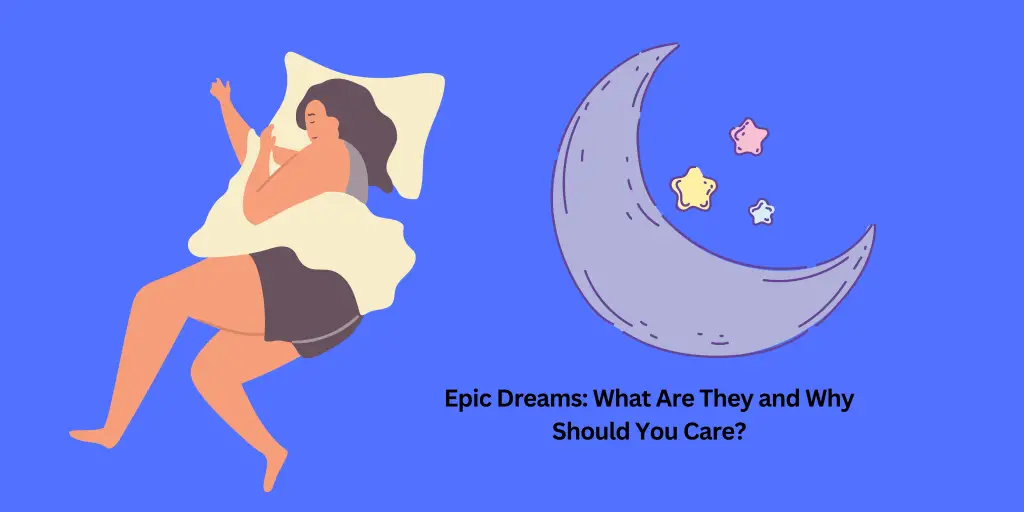
Many of us are not familiar with epic dreams and are even unsure of how to describe them. Epic dreams are simply powerful, life-changing experiences that can be seen through visions or heard through voices in our minds. They often come in the form of creative ideas, spiritual guidance, or physical sensations.
Epic dreams are not necessarily good or bad – they just challenge us to think differently and to expand our ideas. They tend to be vivid, dramatic, and sometimes even frightening.
However, it is important to note that epic dreams are not necessarily prophetic in nature; rather, they often prompt us to take action or make decisions for our own development and growth.
So, what are epic dreams exactly?
Epic dreams are vivid, detailed dreams that frequently involve a sense of adventure or a grandiose theme. They are typically longer and more complex than ordinary dreams, with multiple plot lines or settings.
Epic dreams can be extremely vivid and memorable, and they frequently leave an indelible impression on the dreamer. They may contain elements of myth, fantasy, or archetypal symbols that inspire awe or wonder.
Some people believe that epic dreams have deep meaning and can reveal the dreamer’s subconscious thoughts and feelings.
Others may interpret epic dreams as divine messages or signs of a greater spiritual purpose.
Whatever you believe, it is critical to reflect on and analyze your epic dreams in order to gain insight into yourself and the world around you.
How do you know if your dream is an epic dream?
Epic dreams frequently have a distinct emotion or quality that distinguishes them from ordinary dreams. They usually have a lot of emotional content and are very vivid and dramatic. Furthermore, intense physical experiences such as flying or floating may occur in epic dreams.
They usually stay with you and can serve as a catalyst for original thought or even drastic action. Furthermore, they may contain legendary or supernatural elements such as gods, goddesses, angels, or even extraterrestrials.
So basically in an epic dream, you might feel like:
- You’re either flying or floating.
- You have an increased sense of emotion and intensity.
- Your dream is unusually long or intricate.
- It contains mythological or spiritual elements.
- The dream provides you with an epiphany or insight.
If you have experienced the sentiments described above, it is possible that you have dreamt of an extraordinary one.
Are Epic Dreams Scientifically Explainable?
Epic dreams are not fully understood scientifically, but some people believe they are caused by strong emotions, mental stress, or psychological trauma.
According to some experts, epic dreams may simply be the result of neurons randomly firing during REM (rapid eye movement) sleep, the sleep stage associated with dreaming.
Some argue that vivid dreams are the brain’s way of organizing and processing the experiences, memories, and emotions of the day.
Some researchers have also linked epic dreams to the activation of specific brain areas associated with creativity, imagination, and problem-solving.
Epic dreams’ neural underpinnings are still largely unknown, but it is clear that they are a fascinating and complicated phenomenon that fascinates both scientists and the general public.
How Do Epic Dreams React to Our Emotions?
The content and intensity of our epic dreams might be significantly influenced by our emotions. Dreams are believed to be impacted by our emotional state at the time, as well as by memories and events from the past.
Strong emotions that we experience in the waking world, such as worry, anxiety, or excitement, can transfer over into our dreams and have an impact on their tone and content.
For instance, someone who experiences dread or anxiety during the day may be more likely to dream of danger or conflict.
On the other side, someone who is content and cheerful may be more likely to have an uplifting and upbeat dream.
According to some experts, our ability to cope with stressful or unpleasant events may be improved by the brain’s ability to integrate and regulate emotions through the use of epic dreams.
What Is the Importance of Recurring Themes in Epic Dreams?
Epic dream common themes may be profoundly meaningful and provide insight into our unconscious minds. These topics have the potential to be deeply personal and significant, representing our most intense aspirations, anxieties, and worries.
For instance, nightmares about falling, being pursued, or losing something priceless may be a sign of insecurity, worry, or failure dread.
Feelings of empowerment, confidence, or accomplishment may be indicated by dreams about flying, succeeding, or attaining a goal.
Epic dreams, according to some academics, can be a source of creativity or inspiration, and examining these themes may produce fresh perceptions and ideas.
In general, the relevance of recurring themes in epic dreams resides in their capacity to provide a window into our most private thoughts and feelings as well as present chances for development, introspection, and self-awareness.
Is it possible that epic dreams are divine messages?
There is no scientific evidence to support the idea that epic dreams are messages from the cosmos or have any sort of spiritual importance, but some people hold to these beliefs still.
Dreams occur naturally in the brain when we sleep, taking on the form of a mental recreation of our day’s events, thoughts, and feelings.
Some people may be predisposed to read spiritual or mystical meanings into their dreams, although this is entirely up to the dreamer.
Even though epic dreams might be insightful into our psyche, they are not always signs of high or otherworldly occurrences.
Why did people have epic dreams?
There are many different reasons why people have epic dreams. It is thought that dreams, a natural process of the brain during sleep, perform a number of significant tasks, including memory consolidation and emotional regulation.
Genetics, brain chemistry, or life events
Due to individual variations in brain chemistry, heredity, or life experiences, some people may have those moments when they drift off into a daydream and find themselves in a world of epic fantasy.
Emotional states
The nature and degree to which one dream can also be influenced by one’s emotional condition, such as when one is under stress, anxious, or depressed.
In addition, outside influences including prescription drugs, dietary restrictions, and sleep disorders can alter dream patterns.
While the precise causes of some people’s epic dreams remain a mystery, it is certain that they are a normal and significant aspect of the human experience.
What Do Our Epic Dreams Teach Us?
Epic dreams can provide insightful perceptions of our emotional and psychological states. We can better understand our ideas, feelings, and behaviors by looking at the themes and content of our dreams.
Repressed desires, worries, and conflicts that we might not be aware of during the daytime can sometimes be revealed in dreams. They can also offer insight into problem-solving, creative inspiration, and a feeling of direction.
Epic dream research can also aid in our understanding of the nature of consciousness and how the brain functions. Ultimately, paying attention to our epic dreams and considering their significance might present fruitful chances for personal development and self-discovery.
How do I stop epic dreams?
1. Understanding your dreams
The first step is understanding why you dream so big in the first place. Oftentimes, our dreams are an escape from reality – they give us something exciting or inspiring to focus on instead of our everyday lives.
2. Starting to make changes
Once you understand why you’re having such intense dreams, it’s time to start making changes that will help keep them under control. One way is by setting realistic expectations for yourself;
Don’t expect overnight success or miracles – instead, focus on achievable goals that will move you closer to your ultimate goal over time. This helps keep things manageable and prevents unrealistic thinking from taking over your life!
3. Creating structure
Another great way to curb excessive dreaming is by creating a structure around how much time each day should be devoted to fantasizing about the future versus working hard towards achieving those goals today!
Set aside specific times during which daydreaming can occur (for example, 10 minutes before bedtime) so that there’s still room for creativity without letting it take away from productivity during other parts of the day.
4. Do not care too much about details
Try not to get too caught up in details when planning out future scenarios; this can lead down rabbit holes where nothing gets accomplished because everything seems like such an overwhelming task!
Instead, break down large tasks into smaller steps with deadlines attached – this makes them more manageable while still allowing some space for creative exploration along the way as well as providing motivation through tangible progress being made every step of the way!
Conclusion
Epic dreams are an enthralling and perplexing aspect of the human experience. While scientific understanding of epic dreams is still limited, it is clear that they can have a profound effect on our emotions, thoughts, and behavior.
By paying attention to and delving into our epic dreams, we can gain a better understanding of ourselves and our place in the world. Epic dreams can give us creative ideas, problem-solving insights, and a sense of direction in our lives.
Epic dreams can teach us about the human mind and help us improve our overall well-being. If you’ve ever wondered about the nature and significance of epic dreams, now is the time to find out.







